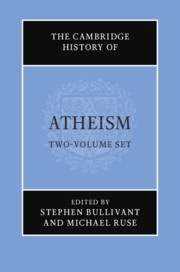Book contents
- The Cambridge History of Atheism
- The Cambridge History of Atheism
- Copyright page
- Dedication
- Contents
- Acknowledgments
- Contributors
- Introduction
- Part I Preliminaries
- Part II Atheisms in History
- Part III Reformation, Renaissance, Enlightenment
- Part IV Classical Modernity: Philosophical and Scientific Currents
- Part V Classical Modernity: Social and Political Currents
- Part VI Twentieth and Twenty-First Centuries: Intellectual and Artistic Currents
- 32 Analytic Philosophy
- 33 Naturalism
- 34 Existentialism
- 35 Atheism and Postmodern Philosophies
- 36 Ayn Rand and Objectivism
- 37 Darwinism
- 38 Literature
- 39 Music
- 40 Visual Arts
- 41 Film and Television
- Part VII Lived Atheism in the Twentieth- and Twenty-First Centuries: Case-Studies
- Part VIII Emerging Atheisms in the Twenty-First Century
- Part IX Conclusion
- Index
- References
37 - Darwinism
from Part VI - Twentieth and Twenty-First Centuries: Intellectual and Artistic Currents
Published online by Cambridge University Press: 25 September 2021
- The Cambridge History of Atheism
- The Cambridge History of Atheism
- Copyright page
- Dedication
- Contents
- Acknowledgments
- Contributors
- Introduction
- Part I Preliminaries
- Part II Atheisms in History
- Part III Reformation, Renaissance, Enlightenment
- Part IV Classical Modernity: Philosophical and Scientific Currents
- Part V Classical Modernity: Social and Political Currents
- Part VI Twentieth and Twenty-First Centuries: Intellectual and Artistic Currents
- 32 Analytic Philosophy
- 33 Naturalism
- 34 Existentialism
- 35 Atheism and Postmodern Philosophies
- 36 Ayn Rand and Objectivism
- 37 Darwinism
- 38 Literature
- 39 Music
- 40 Visual Arts
- 41 Film and Television
- Part VII Lived Atheism in the Twentieth- and Twenty-First Centuries: Case-Studies
- Part VIII Emerging Atheisms in the Twenty-First Century
- Part IX Conclusion
- Index
- References
Summary
Darwinian evolution is an overarching explanatory framework that makes sense of the characteristic patterns of the biological world. Evolutionary science is a progressive research program that is as well-confirmed as findings in other scientific disciplines. In this sense, it is not different from chemistry or physics. There is one significant difference, however, in that evolution continues to be subjected to regular attacks from some religious quarters, especially in the United States, where the issues have had considerable political, legal, and sociocultural significance.
- Type
- Chapter
- Information
- The Cambridge History of Atheism , pp. 666 - 685Publisher: Cambridge University PressPrint publication year: 2021



